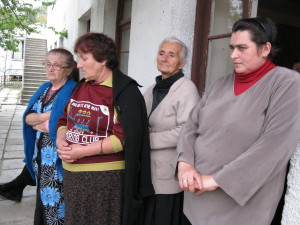IOCC in Georgia: Displaced Families Facing Harsh Winter
The leaves have already changed in Tskvarichamia, a mountain hamlet about 15 miles above Tbilisi. For the 16 families taking shelter in a modest building, this is not a herald of the harvest, but rather, an ominous reminder that winter is coming and they are not prepared.
At dusk, two mothers, their children and an elderly couple sit on the front porch and explain to an aid worker that the rest of the families have gone to the authorities to protest their living conditions and to demand that they be moved to Tbilisi. “We feel cut off up here,” says Nanna, carrying her small son on her lap. “It is cold and we cannot properly care for our children.” She and her husband were farmers in the village of Kemerti in South Ossetia, and like many who were displaced by this summer’s fighting between Russian and Georgian forces, they fled with little more than the clothes on their backs.

Families who fled the fighting in South Ossetia last August face a harsh winter. A new grant allows International Orthodox Christian Charities (IOCC) to help 2,000 individuals with stoves, fuel for cooking and heating, bedding, winter clothes, and cooking supplies. (photo credit: IOCC Baltimore) |
The group that had gone to Tbilisi return, and seeing the visitor immediately launch into a litany of complaints. They have no kitchen utensils. Blankets were delivered but the mattresses are no good. Above all, the building was formerly used as a summer camp for children and there is not enough insulation from the cold. “We may be blocked up here from other areas in the winter and our children have to go to school,” says one woman.
Inside the building there is a strong smell from toilets that are backed up. In the hallway, there is a list of government phone numbers such as “how to find a missing relative.” The hallway leads to a series of bedrooms with thin walls and blankets draped over windows.
The group moves from room to room, eager to show the aid worker mattresses atop rusty springs and thin blankets that were delivered in August. Some speculate about their neighbors, Ossetians who fled to Russia. “We had good relations with them because of the mixed families,” says one woman. She believes that those families got an offer to go back to South Ossetia, where Georgians can no longer return.
International Orthodox Christian Charities (IOCC) has been providing continuous assistance to thousands of displaced people who fled to other parts of Georgia, as well as Russia, since the August conflict began. Through a new $200,000 grant by the Office of U.S. Foreign Disaster Assistance (OFDA), IOCC will help 2,000 individuals get through the winter by providing stoves, fuel for cooking and heating, bedding, winter clothes, and cooking supplies. IOCC is cooperating with the Georgian Orthodox Church and local authorities to identify and assist families in 20 displacement centers in and around Tbilisi, including the families of Tskvarichamia.
These families want to return to their villages in South Ossetia, a hope that is fading as the months pass on. “The hardest feeling,” says Elsa, a 32-year-old mother of two, “is to not know what has happened to everything that we built and worked for.”
To help in providing emergency relief, call IOCC’s donation hotline toll-free at 1-877-803-4622, make a gift on-line at www.iocc.org, or mail a check or money order payable to “IOCC” and write “Conflict in the Caucasus” in the memo line to: IOCC, P.O. Box 630225, Baltimore, Md. 21263-0225.
IOCC, founded in 1992 as the official humanitarian aid agency of the Standing Conference of Canonical Orthodox Bishops in the Americas (SCOBA), has implemented over $275 million in relief and development programs in 33 countries around the world.
